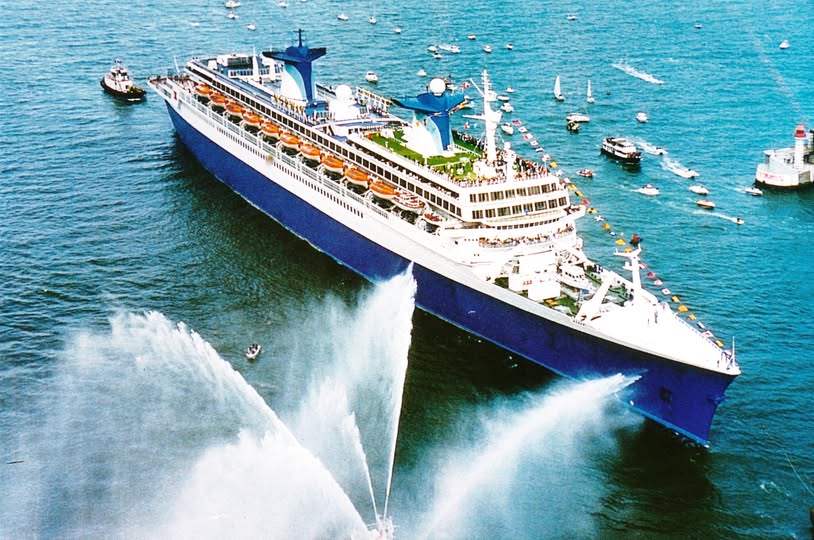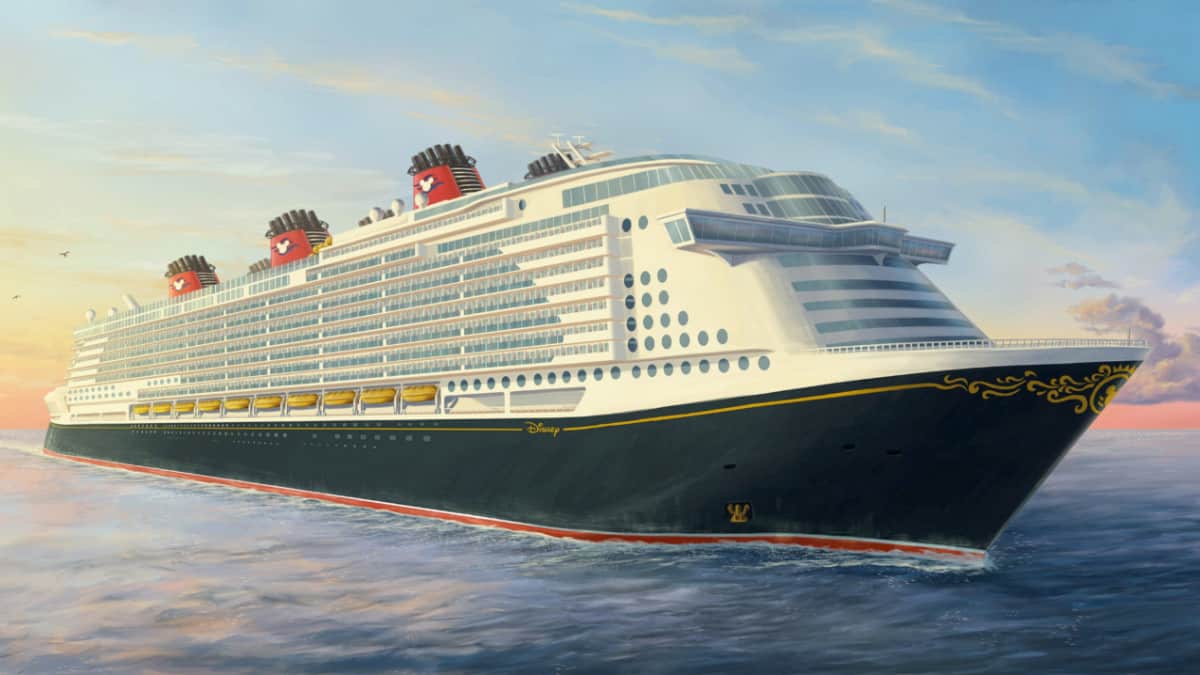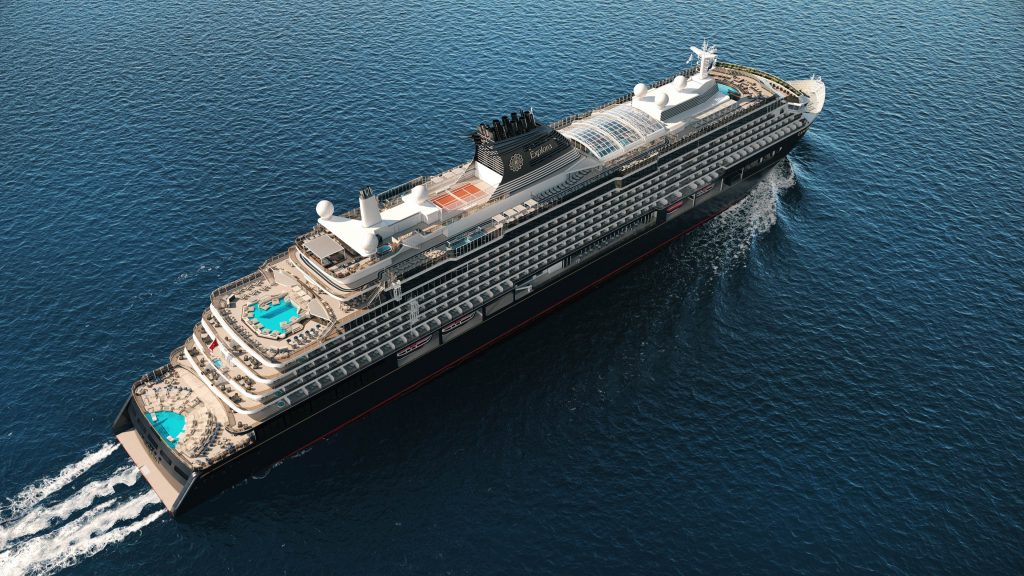Funchal’s last owner, Signature Living, a hotel chain from Liverpool, had plans to operate the veteran liner/ cruise ship as a hotel in central London and later as a party club ship, sailing from Liverpool to the Mediterranean. But these plans did not materialize and still in lay up and for sale, her future looks very bleak at the moment.
Funchal has a rich history, she was once part of the impressive Portuguese passenger ship fleet. In the late 1950’s , Empresa Insulana de Navegacao (also named Insular Line, owned by one of the wealthiest families in the Azores and dating back to 1871 when they started liner services between Lisbon the capital of Portugal to the islands of the Azores, Madeira and Cape Verde), needed a new vessel. This new ship was to replace the ss Lima which had been built back in 1907 for North German Lloyd and was now over 50 years old. Although the Portuguese had hoped she would be built in Portugal, a Danish yard came with a much cheaper offer, so Elsinore shipyard, based at Helsingor, Denmark built her, but under the guidance of Rogerio d’Oliveira, a well-known Portuguese naval engineer.

Funchal – named after the capital of Madeira – after being launched in February 1961, was fitted out until October that year. On November 4th the 9.800GRT Funchal left Lisbon, her homeport for her maiden voyage. Whilst in liner service, she carried 400 passengers in three classes, 80 in first class, 156 in Tourist A ad 164 in Tourist B class. As was common practice for liners at the time, she carried cargo (mail, fruits, even cars ) in three holds, two forward and one aft. Her normal circuit was Lisbon, Funchal, Ponta Delgada, Horta and Angra do Heroismo, and this was later expanded to the Canary Islands. She instantly was a success and the company, seeing her filled to capacity voyage after voyage, decided they needed a second vessel to back her up. She was joined by the former Israel which had been acquired from Zim Lines (Israel), a combination passenger-cargo liner. She was renamed Angra do Heroismo. The Portuguese President Thomas used Funchal several times as his yacht of state when visiting the Azores, Madeira, Guinea-Bissau and Brazil in 1969 and 1972. During the second of these trips to Brazil, Funchal suffered boiler problems and after repairs at sea just made it in time for the planned celebrations in Brazil. This was not the first time Funchal’s boilers were troublesome and it was obvious these problems needed to be addressed soon.
Like on other liner services, passenger loads diminished as travellers switched to air travel and although Funchal had been used as a cruise ship now and then, her owners decided she was to be converted to a full time one-class cruise ship now. Apart from her interior being upgraded to cruise standards, she was reengined. Her troublesome boilers and Parsons steam turbines were replaced by Dutch Werkspoor diesel engines. This resulted in a lower operating speed, which used to be 20 knots and now was reduced to 17 knots which sufficed for cruise service. Conversion took place at Amsterdam, at the Nederlandse Dok en Scheepsbouw Maatschappij (Dutch Dock and Shipbuilding Cy) in 1972/ 1973. After a short time in cruise service she also changed to a gleaming white hull, suitable for a cruise ship. In fact she had returned to her former route to the Atlantic Isles, but sailing from Zeebrugge and Dover these trips were marketed as cruises.

Her owners, who, after a financially troubled period had become part of the newly formed Companhia Portuguesa de Transportes Maritimos (CTM) after merging with the Cia. Colonial (which was founded in 1922 and traded between Portugal and its colonies with combination liners and freighters) continued to operate her on her familiar route. But the economic recession in Portugal at the time put Funchal out of work as almost all of her clientele was Portuguese and there were less and less cruise passengers, making Funchal unprofitable almost overnight. After a period of lay up in 1975 new employment was found for Funchal in the charter market. She spent the summer sailing in Northern waters out of Sweden for a joint venture between Swedish cruise operator Fritidskryss and Greek shipowner George Potamianos. She also continued her cruise service to the Atlantic Isles part of the year and in winter she was deployed in South-American waters out of Brazil.

Her charter to Fritidskryss/ Potamianos proved to be a success and she returned to spend the summer cruising Northern Europe year after year. However after several successful years on the charter-market Funchal was laid up in 1985 and was sold at auction as her owners CTM who were state owned were shut down by the Portuguese government because of poor financial results. She was purchased by Great Warwick Inc, founded by George Potamianos and managed by Arcalia shipping, also Potamianos owned. After Funchal, a second vessel was acquired, also an ex Portuguese Liner, Infante Dom Henrique which was refurbished and sailed for the company as Vasco da Gama but was sold shortly thereafter. Other ships, all classics were added to the fleet, Arion the former Yugoslavian cruise ship Istra (1965), both ex-Carras vessels Princess Danae and Daphne (both 1955) and the Athena, ex-Stockholm (1948). By having these ships constantly refitted they stayed in great condition with immaculate interiors.

Over the years, Funchal remained a successful cruise ship which is amazing, as the cruise industry saw the introduction of mega-cruise ships, starting with the ss Norway (the converted French liner France) in 1980. These ships were packed with spectacular amenities Funchal did not have. She offered a traditional cruise experience in a homely ambience with of course the famous Portuguese hospitality and service. She had found herself a niche-market. Her modest size made it possible for her to call at ports larger vessels could not. Of course the basis for her success lay in the philosophy of her owner Mr. Potamianos. He was of the opinion that his company should not aim at on board expenses by passengers but earn its revenue from cruise ticket sales, offering interesting destinations instead of theme-park like vessels. And Funchal with her piano bar, show lounge, lido bar, club room, library, card room and boutique just did that, offering a classic cruise experience, as did all five of the Classic International Cruises ships.

In 2004 she was sent to Australia where she made coastal voyages and cruised to Indonesia and Asia. She returned here for another four years and here also, Funchal was very successful with many repeat passengers. Although being 47 years of age, her owners decided to upgrade her to make her comply with the SOLAS (Safety of Lives at Sea) regulations of 2007. This refit was finished in 2008 and was repeated for again a new set of SOLAS rules in 2010. Apart from a technical upgrade also work on her public spaces was planned, these were redecorated to higher standards cruise passengers demanded at the time. Alas, George Potamianos passed away in May 2012 and his two sons took over his company. They lacked their fathers know-how of the shipping industry obviously and in September 2012 already, most vessels of Classic International were detained for unpaid bills. Not much later the company went into liquidation. Now being partly upgraded for SOLAS 2010 regulations Funchal remained in lay up awaiting her fate which almost sure would be the scrapyard. But this cat with nine lives survived again and in 2013 Portuguese entrepreneur Rui Alegre took over the entire Classic International fleet (apart from Princess Daphne). Alegre had the refit of Funchal completed and she emerged fresh from the yard, even sporting her black hull and yellow funnel of her Empresa Insulana days again! Naval Rocha shipyards in Lisbon had upgraded her to a 4-star passenger vessel at the cost of nearly EUR 10 million. Yet another technical upgrade like for example new navigational equipment had extended Funchal’s life with one, maybe even two decades!

However, when she arrived in Gothenburg, Sweden for her first cruise on August 27 2013 she was detained due to security issues. Her watertight doors did not close completely, her crew was not familiar with emergency procedures etc. A week later matters were solved and she departed on her maiden trip after her extensive upgrade.
Alegre’s company, Portuscale cruises operated Funchal themselves but she was also chartered out periodically as she had been before. However, Portuscale Cruises was new in the cruise business and its management lacked in depth knowledge of shipping and the cruise industry and several bad decisions cost the company serious sums of money. Although Funchal, after her recent overhaul was in pristine condition, not one interested party came forward.

Finally in December 2018 the vessel was auctioned off for EUR 3,9 million. Once again she had escaped the breakers torch! Funchal was acquired by the Liverpool hotel operator Signature Living to start a new life as a hotel ship in Central London. At the auction, Signature Living was represented by QPS Marine Ships (a ship broker from Florida). It later became clear that Signature Living via QPS Marine Ships had negotiated for almost 2 years with the bankruptcy administrator for purchasing the vessel. A GBP 4 million refurbishment was planned, Funchal would provide 632 beds, inside and sea view rooms, for single, double and even 8 to 16 guests occupancy in one stateroom, called a partyroom with a private deck and jacuzzi. The luxurious presidential suite would accommodate just 4 passengers. A concierge team would be there, dedicated to plan the onboard party schedule and spectacular entertainment like El Teatro’s parties, Champagne Charlies Brunch At Sea, famous DJs, and special performances like Alma De Cuba (carnival-style dance performers) etc.

Plans changed a couple of times, at a later stage a project was planned for converting Funchal into a luxury party hotel ship. Homeported in Liverpool from where she would operate roundtrip cruises to Spanish ports in the Mediterranean, including Ibiza, Palma de Mallorca, Malaga, Puerto Banus (Marbella) starting spring 2020. Planned onboard experiences in this revised plan now featured gourmet dining and special exquisite bar service (via a partnership with Alma De Cuba), 5-star hotel rooms and luxury amenities, beach-style deck parties with famous DJ’s.
This would have been a strange way indeed for this now historic ship to end her days. But Signature did not do anything with Funchal, no work was actually done and she is now for sale again, still being moored in Lisbon. Signature Living reportedly have changed their minds and they hope to sell Funchal for a profit.

Again her future looks troubled as she may be scrapped now as because of the COVID-19 pandemic situation, several much younger cruise ships like Costa Victoria being only 24 years old as well as Pullmantur ships Sovereign (1988) and Monarch (1991) have recently been sent to the breakers and many vessels will be available on the second hand market when cruise lines falling on hard times will want to discard their older and smaller ships.
So those with a passion for classic passenger ships are holding their breath if Funchal will make it back to active service once again as it would be a such a shame to see yet another veteran vessel disappear, especially one being in mint condition like Funchal…




